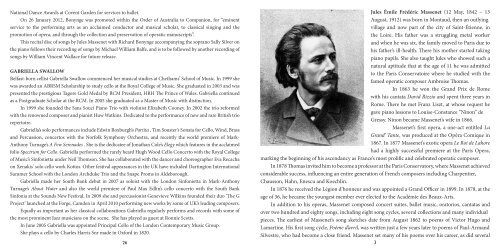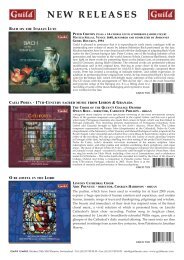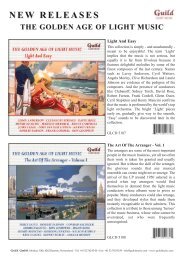Gabriella Swallow, Richard Bonynge and Sally Silver
Gabriella Swallow, Richard Bonynge and Sally Silver
Gabriella Swallow, Richard Bonynge and Sally Silver
Create successful ePaper yourself
Turn your PDF publications into a flip-book with our unique Google optimized e-Paper software.
National Dance Awards at Covent Garden for services to ballet.<br />
On 26 January 2012, <strong>Bonynge</strong> was promoted within the Order of Australia to Companion, for “eminent<br />
service to the performing arts as an acclaimed conductor <strong>and</strong> musical scholar, to classical singing <strong>and</strong> the<br />
promotion of opera, <strong>and</strong> through the collection <strong>and</strong> preservation of operatic manuscripts”.<br />
This recital disc of songs by Jules Massenet with <strong>Richard</strong> <strong>Bonynge</strong> accompanying the soprano <strong>Sally</strong> <strong>Silver</strong> on<br />
the piano follows their recording of songs by Michael William Balfe, <strong>and</strong> is to be followed by another recording of<br />
songs by William Vincent Wallace for future release.<br />
GABRIELLA SWALLOW<br />
Belfast-born cellist <strong>Gabriella</strong> <strong>Swallow</strong> commenced her musical studies at Chethams’ School of Music. In 1999 she<br />
was awarded an ABRSM Scholarship to study cello at the Royal College of Music. She graduated in 2003 <strong>and</strong> was<br />
presented the prestigious Tagore Gold Medal by RCM President, HRH The Prince of Wales. <strong>Gabriella</strong> continued<br />
as a Postgraduate Scholar at the RCM. In 2005 she graduated as a Master of Music with distinction.<br />
In 1999 she founded the Sans Souci Piano Trio with violinist Elizabeth Cooney. In 2002 the trio reformed<br />
with the renowned composer <strong>and</strong> pianist Huw Watkins. Dedicated to the performance of new <strong>and</strong> rare British trio<br />
repertoire.<br />
<strong>Gabriella</strong>’s solo performances include Edwin Roxburgh’s Partita , Tim Souster’s Sonata for Cello, Wind, Brass<br />
<strong>and</strong> Percussion, concertos with the Norfolk Symphony Orchestra, <strong>and</strong> recently the world premiere of Mark-<br />
Anthony Turnage’s A Few Serenades . She is the dedicatee of Jonathan Cole’s Elegy which features in the acclaimed<br />
folio Spectrum for Cello. <strong>Gabriella</strong> performed the rarely heard Hugh Wood Cello Concerto with the Royal College<br />
of Music’s Sinfonietta under Neil Thomson. She has collaborated with the dancer <strong>and</strong> choreographer Eva Recacha<br />
on Xenakis’ solo cello work Kottos. Other festival appearances in the UK have included Dartington International<br />
Summer School with the London Archduke Trio <strong>and</strong> the Snape Proms in Aldeborough.<br />
<strong>Gabriella</strong> made her South Bank debut in 2007 as soloist with the London Sinfonietta in Mark-Anthony<br />
Turnage’s About Water <strong>and</strong> also the world premiere of Paul Max Edlin’s cello concerto with the South Bank<br />
Sinfonia at the Sounds New Festival. In 2009 she <strong>and</strong> percussionist Genevieve Wilkins founded their duo ‘The G<br />
Project’ launched at the Forge, Camden in April 2010 performing new works by some of UK’s leading composers.<br />
Equally as important as her classical collaborations <strong>Gabriella</strong> regularly performs <strong>and</strong> records with some of<br />
the most prominent Jazz musicians on the scene. She has played as guest at Ronnie Scotts.<br />
In June 2005 <strong>Gabriella</strong> was appointed Principal Cello of the London Contemporary Music Group.<br />
She plays a cello by Charles Harris Snr made in Oxford in 1820.<br />
26<br />
Jules Émile Frédéric Massenet (12 May, 1842 – 13<br />
August, 1912) was born in Montaud, then an outlying<br />
village <strong>and</strong> now part of the city of Saint-Étienne, in<br />
the Loire. His father was a struggling metal worker<br />
<strong>and</strong> when he was six, the family moved to Paris due to<br />
his father’s ill-health. There his mother started taking<br />
piano pupils. She also taught Jules who showed such a<br />
natural aptitude that at the age of 11 he was admitted<br />
to the Paris Conservatoire where he studied with the<br />
famed operatic composer Ambroise Thomas.<br />
In 1863 he won the Gr<strong>and</strong> Prix de Rome<br />
with his cantata David Rizzio <strong>and</strong> spent three years in<br />
Rome. There he met Franz Liszt, at whose request he<br />
gave piano lessons to Louise-Constance “Ninon” de<br />
Gressy. Ninon became Massenet’s wife in 1866.<br />
Massenet’s first opera, a one-act entitled La<br />
Gr<strong>and</strong>’ Tante, was produced at the Opéra Comique in<br />
1867. In 1877 Massenet’s exotic opera Le Roi de Lahore<br />
had a highly successful premiere at the Paris Opera,<br />
marking the beginning of his ascendancy as France’s most prolific <strong>and</strong> celebrated operatic composer.<br />
In 1878 Thomas invited him to become a professor at the Paris Conservatory, where Massenet achieved<br />
considerable success, influencing an entire generation of French composers including Charpentier,<br />
Chausson, Hahn, Enescu <strong>and</strong> Koechlin.<br />
In 1876 he received the Légion d’honneur <strong>and</strong> was appointed a Gr<strong>and</strong> Officer in 1899. In 1878, at the<br />
age of 36, he became the youngest member ever elected to the Académie des Beaux-Arts.<br />
In addition to his operas, Massenet composed concert suites, ballet music, oratorios, cantatas <strong>and</strong><br />
over two hundred <strong>and</strong> eighty songs, including eight song cycles, several collections <strong>and</strong> many individual<br />
pieces. The earliest of Massenet’s song sketches date from August 1862 to poems of Victor Hugo <strong>and</strong><br />
Lamartine. His first song cycle, Poème d’avril, was written just a few years later to poems of Paul-Arm<strong>and</strong><br />
Silvestre, who had become a close friend. Massenet set many of his poems over his career, as did several<br />
3

















